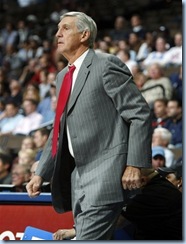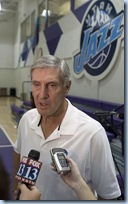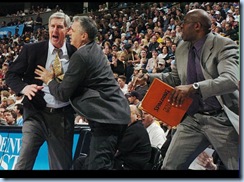| An eternity ago I wrote about The Five Epic Errors of Jerry Eugene Sloan. There were a variety of reactions to that article, some in agreement, others in argument -- ultimately though I think it was a pretty interesting take on things. Jerry isn't perfect -- and the points I made way back in September seem to elucidate that point quite nicely. That said . . . there are very few coaches that I'd want to be the coach of my team (the Jazz), and I can't really think of any off the top of my head. (Maybe Lenny Wilkins? Maybe not . . . no, definitely not.) It's not all bad with Jerry, in fact, there is a lot of good out there. Here are just five: |  |
| Photographed by David Zalubowski for AP Photo |
1. He's a no nonsense guy:
 | Jerry is a straight shooter. He tells it like it is. If his team gets beat on the glass he'll say it like it is. If he messes up, he'll own up to it. If he wants a player to do something, he'll try to communicate it. Jerry probably doesn't think himself to be 'smart enough' to be any other way but humble, direct and honest. He may miss out on some of the cerebral mind games that some other coaches play (against their own rosters as much as they play it against the media and refs) like Phil Jackson. (Btw, he's not zen. That's bullshit. Really, stop calling him the zenmaster. Zen Buddhism isn't about making $10 Million dollars per year, possessions are fleeting . . . but he wouldn't know that, because he's a fraud) Anyway, back to Jerry . . . Sloan isn't going to be all smug and cryptic all the time, and then whine to the media in post game interviews about the other team. |
I remember reading an interview of Jackson's years ago when he was first coaching the Lakers -- they lost a game and he blamed the loss on everything from his players injuries, the crowd noise, the pre-game festivities, to refs, the style of play, and on the fouls not called -- he basically blamed the loss on everything BUT the other team doing things well.
That's just a sore loser to me.
Jerry may not have any Coach of the Year awards, or coached any team that's won a ring, but when he does lose, he does it graciously as he's a no nonsense guy. Even better than Jackson, he also wins with humility, and he tries to treat his players fairly (which is subjective). Maybe a more touchy-feely coach would have been able to coax more out of the Ostertags and Giriceks that Sloan has had to coach . . . but that's just not Jerry's strong suit.
2. Jerry fights for his players:
| One of his strong suits is that he'll never throw his players under the bus (or, you know, write a book about a particularly difficult season, airing out all the secret details without his players' consent and laugh all the way to the bank while talking trash about his meal tickets). Jerry does the exact opposite, as he's frequently ejected from games because he cares so much about his players. What does Phil Jackson do? He sits with his legs crossed in a chair all game long and occasionally whistles at his players. That's inspiring. Jerry Sloan gets into it with refs when he feels like his players are getting the short end of the stick. |  |
Players are going to be willing to fight if they see how hard their coach his fighting. Very rarely do the Jazz lose games (to the best of my memory) that Sloan is thrown out of, they tend the get fired up and play harder. Not to make this one of those really weepy eyed, inspirational deals . . . I can see Sloan making a Tony D'Amato type of speech while Phil Jackson would be reading a poem about rabbits and hoping that his talented roster does all the work.
Jerry Sloan was a fighter as a player, and as a coach he is responsible for taking care of his team out there. It's not the place of the players to really talk to the refs, but it's the Head Coach's duty to do so when he feels like his guys are getting the screwjob. I'd rather have a coach who actually reacted to the game than one who sat down and did a Sudoku puzzle.
3. Superb game to game adjustments:
I mentioned this in the other write-up, but I honestly don't see the Jazz getting beat the same way more than once, unless in the rare cases that the are playing a team that just has our number (like the Minnesota Timberwolves or Portland Trailblazers last season), or one really unstoppable guy (Kobe Bryant). There's one good reason why we don't get beat the same way often -- it's because Sloan (and his staff) make really good adjustments in-between games. Sloan does his homework, and his vast experience makes it a bit easier to see patterns and develop strategies. He's a very under-rated X's and O's guy -- people talk about Rick Pitino knowing about shooting range and shooting percentage ratios. Pitino was a horrible NBA coach though, and didn't do anything in the league. Partly because he relied a little too much on the three point shot.
Sloan, on the other hand, doesn't rely on anything except rebounding, hustling on defense, and playing fundamentally sound basketball -- especially on offense (layups are emphasized, one on one play and three pointers are not).
4. Fundamentals aren't just buzzwords with him:
Frankly, this is one of the reasons why the Jazz have won so many games under Sloan (closing in on 1000 with the Jazz). If you don't box out your man he'll replace you with someone who will. If you don't run the plays, you'll sit on the bench. There are really three components of Jerry's offense: move the ball around for a layup, get to the foul line, don't try to be a hero -- pass the ball instead of taking a contested shot. There are really three components of Jerry's defense: funnel guards into bigmen, don't leave shooters open, don't foul jump shooters. This is pure, distilled fundamental basketball that can be applied to grade school ball all the way up to the NBA.
Some coaches play lip service to fundamentals, and when the game starts, their players play some undisciplined monkey ball, or alternatively, the game plan shifts to a series of gimmicks . . . like posting up their PF at the three point line (like what Avery had Dirk do instead of posting him up near the basket), or just relying on one player to do everything for his team, and have no real plays or anything ("Chris Paul -- go dribble a lot, and when the defense collapses on you, pass to an open guy. Do this 40 times a game! Go!" -- Byron Scott). Is it any wonder that teams coached by those types of players rarely impress in the post season?
If you play fundamentally sound basketball your team has a chance to win -- regardless of the make up of the roster, or how many super star calls you get. He almost made the playoffs with Carlos Arroyo and Ben Handlogten. Phil Jax would have retired that season because he didn't have any top 2 players on his team. (Seriously Phil, take a chance on your coaching ability and actually coach a team instead of relying on your player's star power . . . remember what it was like when you got beat by Detroit and Boston in the finals the last few seasons? Those teams were coached... yours was on autopilot after having the West given to you on a platter.)
5. Expects you to leave it all on the floor
Simple, huh?
| Now watch this video of Al Pacino showing us how to inspire professional athletes/professional actors playing professional athletes. It's not just because it's a good scene, but I'm sure there's a lot of Jerry in this scene . . . especially the part about the guy who's willing to die being the one who's going to come out alive. Sloan's not a perfect coach, but just like how I ended the critical article, I still feel like there is no other coach I'd want to coach the Jazz this season. | |
His faults are still faults, and his propensity to make people have to earn it when they are clearly better can be a problem at times -- but really, aren't you happy that Jerry coaches the Jazz, and not that smarmy, self-aggrandizing pseudo-intellectual Phil Jackson?
I know I am.



0 comments:
Post a Comment